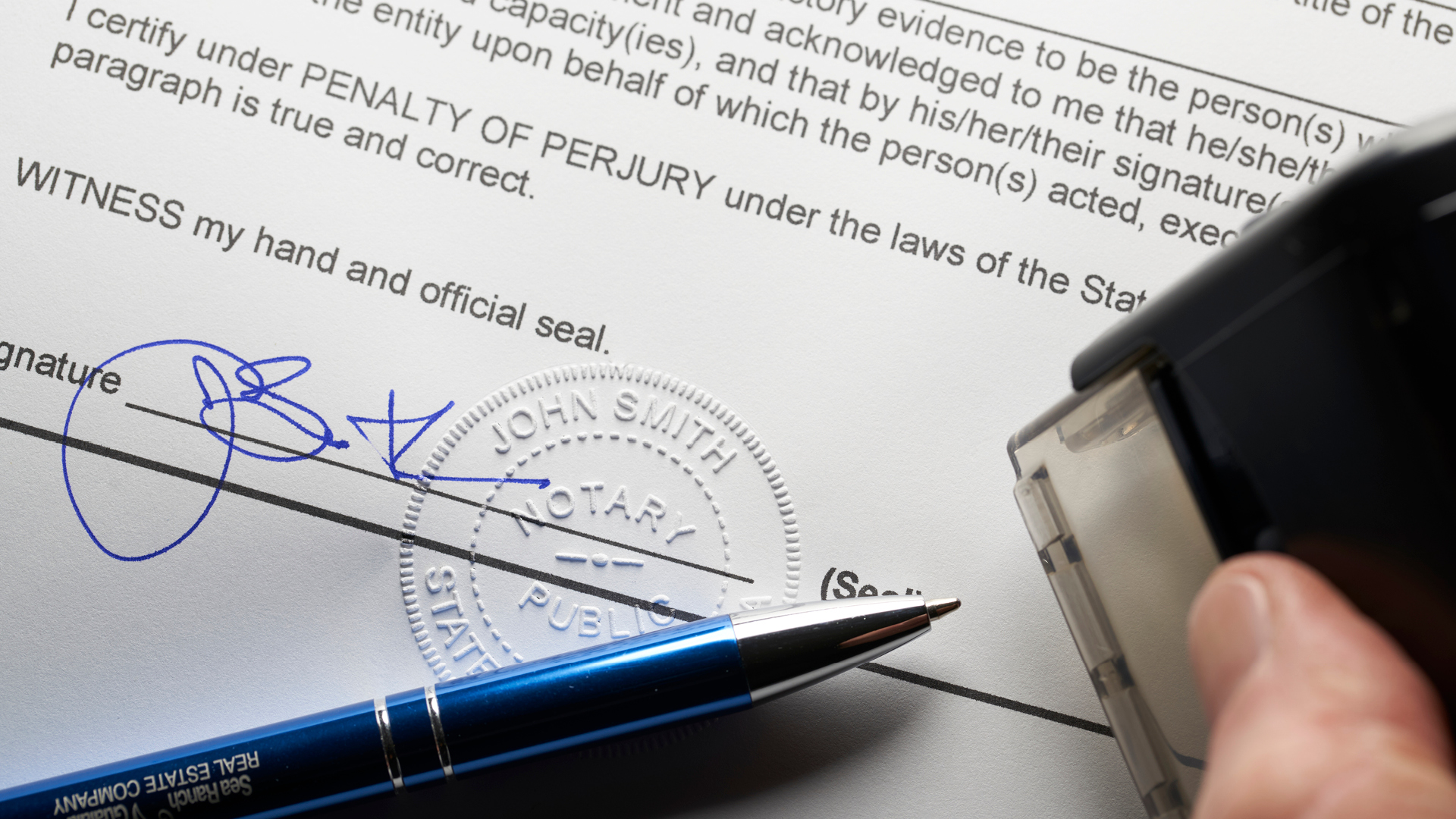
What Happens If a Trust Is Signed Without a Notary?
In California, the execution of a trust does not technically require notarization. That surprises many people—and it can have real consequences. While a trust may be legally valid without a notary’s seal, the lack of notarization can complicate matters significantly if that trust is ever challenged in court.
At Trust Law Partners, we’ve handled many trust disputes where a missing notary was the small detail that opened the floodgates to litigation. It is important to understand the legal framework behind notarization, how its absence affects trust litigation, and why it matters more than people think.
Is a Notary Required to Make a Trust Valid in California?
Under California Probate Code, a written trust does not require notarization to be considered legally valid. A trust instrument must include:
- Identification of the settlor
- Designation of beneficiaries
- A clear statement of intent to create the trust
- Signature of the settlor
That’s it. A notary’s signature and stamp are not listed among the statutory requirements.
But this legal technicality is not the full story.
In the real world of trust litigation, notarization is often a crucial safeguard. It doesn’t make a trust more legal—but it can make it more defensible. The lack of notarization doesn't invalidate a trust, but it can severely weaken its credibility in a courtroom, especially if there's a dispute over capacity, fraud, or undue influence.
Why Does Notarization Matter in Litigation?
Notarization acts as a neutral third-party verification that the person signing a document did so willingly, knowingly, and while mentally competent. When a trust is notarized, the court receives a stronger presumption that the document is authentic.
Without that verification, everything becomes open to interpretation.
We often see this in late-in-life estate planning changes. For example, a parent amends their trust at age 88 to disinherit one of their children and instead give the bulk of their estate to a new caregiver. If that amendment wasn’t notarized, it creates an immediate question of whether the signature was coerced or fabricated, especially if the parent was physically or mentally vulnerable.
In litigation, attorneys will use the lack of notarization to their advantage:
- They’ll argue the document was signed in secret.
- They’ll challenge the settlor’s mental state.
- They’ll raise questions about forgery.
- They’ll emphasize the absence of neutral witnesses.
And without a notary, it becomes far easier for those arguments to stick.
A Real-World Example: Disinheritance Without a Notary
Trust Law Partners represented beneficiaries in a high-stakes case involving a late-stage trust amendment that dramatically changed the estate plan. The decedent had created a detailed trust years earlier, leaving assets to her children, grandchildren, and charities. But in the final six months of her life, that trust was amended to cut out nearly everyone and leave everything to a live-in acquaintance.
The amendment wasn’t notarized. Worse, it was printed using a free online template and signed at a kitchen table with no third-party witnesses present. When our firm began litigation, the lack of notarization became one of the central issues in our challenge. We obtained medical records, witness statements, and handwriting comparisons to build a case that the document was created under undue influence.
Ultimately, the court ruled in our clients’ favor. The judge didn’t explicitly void the amendment due to the lack of notarization—but it made the rest of our evidence more credible. Without a notary to vouch for the document, every piece of contrary evidence carried more weight.
How Courts View Notarized vs. Non-Notarized Trusts
Judges are trained to look for indicators of reliability. A notarized trust doesn’t make a judge automatically rule in its favor, but it removes many of the doubts that typically fuel litigation.
When a trust is notarized:
- There’s strong proof the person signed voluntarily.
- The date and execution details are fixed.
- There’s less room for claims of forgery or manipulation.
When a trust is not notarized:
- Judges look more critically at surrounding circumstances.
- Medical records and witness testimony gain importance.
- Disgruntled heirs can build narratives that are harder to refute.
So, while notarization isn’t required by law, it often tips the balance in contested cases.
What About Related Documents?
Even if a trust itself doesn’t require notarization, many related documents do—especially when real estate is involved.
If the settlor wants to transfer a home or rental property into the trust, they must execute a deed transferring ownership from their individual name into the name of the trust. That deed must be notarized to be recorded with the county. Failure to do so can result in serious consequences:
- The property may still be considered outside the trust.
- Probate could be required.
- The distribution could be delayed or altered.
- Heirs may argue that the trust never legally owned the asset.
We’ve litigated several cases where a trust mentioned a property, but the deed was never recorded—and the title remained in the individual’s name. If that happens, the property may not be subject to the trust’s terms, opening the door to competing claims.
Common Situations Where a Missing Notary Creates Problems
Here are some of the most common scenarios where the absence of notarization has led to litigation:
- Late-stage Trust Amendments
- DIY Trusts or Online Templates
- Disinheritance of Family Members
- Verbal or Informal Instructions
- Trusts Prepared Without Legal Guidance
The Bottom Line: Notarization Is a Smart Preventive Tool
A notary’s presence can’t guarantee that a trust won’t be challenged—but it can make those challenges much harder to win.
We encourage clients and attorneys alike to take notarization seriously, especially when:
- Creating or amending a trust late in life
- Making major changes in beneficiaries
- Including or excluding family members from the estate
- Handling large or complex asset portfolios
Even though it’s optional under California law, it’s essential from a litigation standpoint. If you're trying to prevent a dispute, notarize the document. If you're trying to defend a trust in court, a notary stamp can become your most valuable witness.
How Trust Law Partners Can Help
Our firm focuses exclusively on trust, estate, and probate litigation. We represent beneficiaries and heirs and our job is to uncover the truth behind questionable estate documents.
We’ve seen cases where a missing notary was the first sign that something wasn’t right. Whether it’s an unsigned amendment, a last-minute disinheritance, or a suspicious change made by someone with access to an elderly relative, we know how to build strong, evidence-based cases.
We do more than raise doubts—we present facts. Medical records, handwriting experts, deposition testimony, and forensic document examiners are tools we use regularly. But it always starts with one question: was this trust executed correctly?
If you’re a beneficiary questioning the validity of a trust—or if you were unexpectedly left out of a loved one’s estate—Trust Law Partners can help you evaluate your options. Even a document that looks “official” can unravel under scrutiny if it wasn’t notarized or executed properly.
A trust that’s not notarized is not automatically invalid—but it is automatically more vulnerable. The cost of notarization is minimal, yet the potential downside of skipping it can be enormous. In high-stakes trust litigation, where millions of dollars are often on the line, that missing stamp can become the crack in the foundation.
Don’t take that risk. Whether you're drafting an estate plan or reviewing one after a loved one’s passing, make sure notarization is part of the process. And if it’s not—and questions arise—you’ll want a litigation team that knows how to hold the right parties accountable.
If you suspect a trust was signed under suspicious circumstances, especially without a notary, call us. We represent beneficiaries across California and Texas in high-conflict trust and estate litigation. Our team knows the courts, the code, and the pressure points that get results.
Contact Trust Law Partners today at 833-878-7852.


